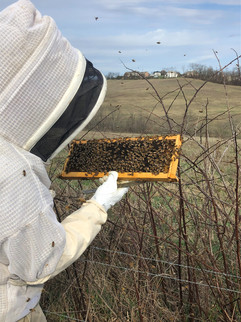
Bees, those tiny little magical insects, will soon be buzzing about. Bees have received a great deal of media attention in the past few years because of their importance—we depend on bees for pollinating over 75 percent of flowering plants and over a third of our crops. They also produce one of the most nutritious sweeteners available—honey.
Honey is the product made by honeybees using the nectar of flowering plants. According to local beekeeper and educator Mike Zewe, it takes the nectar of 2 million flowers to make a pound of honey from bees foraging within a four-mile radius of their hives. There are over 300 types of honey, including clover, wildflower, alfalfa and honey made from a variety of flowering trees in the spring, as well as honey made from goldenrod, aster and buckwheat in the fall.
“Spring honey is usually lighter in color than fall honey,” Zewe said, adding that the various varieties also vary in flavor and odor.
Nutritionally, honey has long been revered as a “super food” and used throughout history as a sweetener and natural medicine. Honey is more concentrated than sugar, so it can be used in smaller amounts. Along with using it to sweeten food, honey has a mix of vitamins, minerals, iron, zinc, amino acids, and antioxidants—one of the reasons it is used as a natural medicine.
Honey is often used as an anti-inflammatory, antioxidant and antibacterial medicine used to treat coughs. When used topically, it can be used to treat burns and wounds. Local honey is also purported to help with allergies since the bees use local flowers to produce their honey; therefore, their honey helps build resistance to those plants.*
According to Mayoclinic.org, research has shown that honey may help reduce cardiovascular disease thanks to the antioxidants; act as a natural cough suppressant; assist with gastrointestinal disease; assist with various neurological diseases; and help promote healing in wounds and burns.
Zewe began beekeeping seven years ago and started teaching others a few years later through the Allegheny Land Trust. A gardener, Zewe said that keeping bees was the next step for him.
“I love it. It’s very Zen and helps the environment,” he said. Zewe’s bees produce about 60 pounds of excess honey per year per hive, with most of it going to friends and family as gifts.
Zewe also eats honey every day. “I use it in my coffee, my tea, on fruit, on bread, on ice cream—really on everything,” he said. “Not only is it better nutritionally, but it is also better for the environment than cane sugar.”
Zewe has lost bees over the years—including to a hungry bear—and recommends that others do a great deal of research and take a class before they get their own hives. “Talk to other beekeepers and find a mentor if you can,” he said.
Local beekeeper Erin Swope started beekeeping in 2017 with her father-in-law, Ron Swope, who owns Swope’s Berries & Bees.
“I got into beekeeping to help him and use my wildlife education. Pollinators have always been fascinating to me,” she said. The Swopes have about 150 hives in various locations in Washington, Allegheny and Beaver counties.
Swope said that is important to opt for raw honey when shopping. “Most store-bought honey is pasteurized at a high temperature, and that kills all the beneficial properties,” she explained. “Raw honey contains vitamins, minerals and antioxidants. The darker the honey, the better it is for you because it contains more antioxidants.”
Swope suggests trying different varieties of honey to determine which flavor you like. “A milder honey, like clover, is great for everyday cooking and won’t change the flavor of the end product as much as something that is more rich, like Japanese knotweed,” she suggested. “Honey is sweeter than regular white sugar, so when using it in baking, use half the amount of honey compared to the amount of sugar.”
Enjoy Honey While Advancing Bee Science
Not everyone wants to have their own hives, of course, which is where Best Bees Company comes in. Best Bees is a company that installs hives in commercial and residential areas for a fee and gathers information used for research at various places including MIT and others. The data is then used to better understand and protect bees. In addition to installing the beehives, a beekeeper comes at least once a month to care for the hive.

“I learn something new every time she visits,” said Donna Stolz of Shaler, who wanted a hive but didn’t have the time and commitment to care for one. “I was warned by other beekeepers that it was a huge commitment and a steep learning curve, especially now that hives are vulnerable to a variety of problems including varroa mites and colony collapse.”
For her part, Stolz receives all of the raw honey that the hive produces and the satisfaction that she is helping with data collection regarding urban and suburban bee colonies in the area. “I also love to sit and watch them take off and return. The hive literally vibrates with activity, even during warmer days in the winter,” she said. “I am also alerted to any webinars the company is hosting so I can hear about all the new data they are collecting.
“It is fascinating,” she added. “Maybe by the time I retire I may have enough time to learn to take care of it myself.”
For information on classes through Allegheny Land Trust, https://alleghenylandtrust.org/events. Visit https://swopesberriesandbees.com for more information on Swope’s farm and products including places to buy locally. For more information on Best Bees, visit https://bestbees.com.
*Please note that you should always consult with your physician before using honey for treatment. Children under the age of one and those who are immunocompromised should never ingest honey.










































Comments